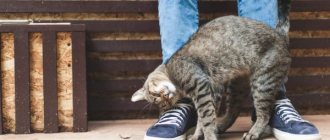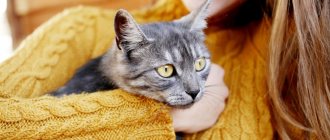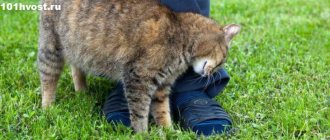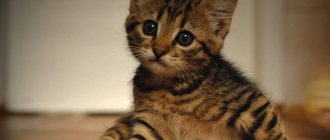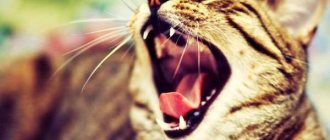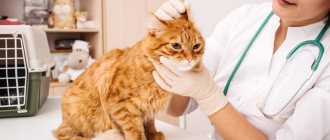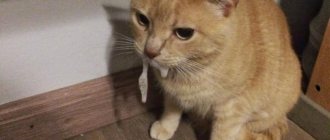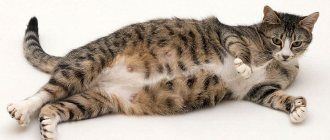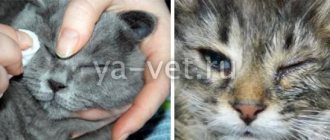There may be several reasons for this behavior. Most often, this is how she shows her love for her owner. Females lick their kittens, thereby ridding them of foreign odors and taking care of them. Therefore, when a cat licks a person, it thus shows its affection for him and “helps” get rid of what it considers foreign odors. After all, for them this is a very important and intimate moment in hygiene. According to another theory, by licking the owner’s fingers, she tries to attract attention to herself and begs for the next portion of delicacy.
Main reasons
Cats are one of the most independent and self-sufficient pets you can keep at home. Some people periodically feel like they are the ones living with their animal, and not the other way around, they behave so proudly. Therefore, when pets start licking their hands, many people want to think that this is only because of strong love and affection. However, this is not entirely true; there are also other reasons for this.
Expressing affection and care
This behavior is one of the main reasons for licking the head, hands, face, and hair of its owner. A cat avoids people who, for one reason or another, are unpleasant to them. This could be a smell, a neglectful or rude attitude towards an animal, and many others. Therefore, if a pet shows sympathy in this way, there is no need to scold or drive him away. This behavior will cause the animal to lose trust. When it becomes uncomfortable from prolonged licking with a rough and wet tongue, you should not drive the cat away, but divert his attention to a treat or toy.
Maternal instinct
After birth, when kittens are still blind and deaf, they communicate with their mother through tactile interactions. Cats lick their offspring many times a day. This moment remains in the memory of animals for life. When they reach puberty, but do not have kittens for one reason or another, they thus demonstrate maternal instinct. Cats begin to lick their owner, thereby replacing the care of kittens. This seems funny and cute, but this behavior should alert the owner; it can harm the health of the pet. In this connection, veterinarians recommend sterilizing animals at the age of less than 12 months, if matings are not planned in the future.
Lack of attention
When the owner does not give his pet enough attention, this is fraught with damage to furniture, torn wallpaper and loss of mutual understanding with each other. Particularly active individuals can even bite a person. There are several signs that your cat wants affection or play that should not be ignored:
- flattens ears;
- nuzzles hand;
- licks the owner's nose and face.
The pet can lie flat on the floor at the owner’s feet and turn one side or another, as if showing an area of the body where it needs to be stroked or scratched.
Many cats enjoy having their foreheads and ears scratched. Moreover, the fur on the forehead should be stroked against growth, and the ears can be pulled a little. Some pets love it if their belly is touched, others cannot stand it. During molting, animals love to be combed, which is also worth taking into account.
If, when caressed by the owner, the cat begins to purr gently, this indicates that she is happy with everything and is enjoying herself.
You can start stroking without waiting for a call from your pet, but take the initiative yourself. To do this, you need to bring your hand to a distance of about 10 cm from the animal and scratch it nearby; if it reaches out and begins to rub against the owner, then the call for affection has been accepted.
Cat dominance
When licking, sometimes a cat shows its dominant role in the family. In this way she means that this person is her property. At the same time, the pet leaves its scent on the owner. If there are no signs of aggression, there is no need to fight this, as this is normal, because it is not for nothing that everyone knows that a cat is one of the most independent pets.
Anxiety and stress
With increased anxiety and stress, a cat often begins to lick itself and its owner. If such behavior has not been noticed before, or if it was much less so, you need to show the animal to a veterinarian, because this is a symptom indicating the presence of some pathology.
Another reason for this behavior is the animal’s low self-esteem. Licking the owner is a way to win him over and keep him safe. At the same time, the pet is tense and will constantly expect a trick, rather than enjoy communicating with the owner.
Boredom
Some animals, often and for a long time being alone, try to have fun on their own. Some start eating a lot, while others start licking. This is a way to cope with boredom. First, they constantly carry out the washing procedure, and then switch to the owner’s things, as well as hair, hands, face, and the person himself. Sometimes animals go so far as to lick until the hair falls out, followed by the formation of a wound in this place that constantly gets wet. At the same time, they do not stop licking, even in such critical situations.
If this happens to pets, you need to seek veterinary help.
Naturally pungent odor from the owner
Cats have a very highly developed sense of smell, so they can lick the hands, feet, and armpits of their owners who come in the evening after work. The fact is that the smell of sweat formed on the human body during the day is a bait for animals. And by licking it, pets try to protect their owner from persecution by other animals and encroachment on their territory.
Communication between cat and owner
Our pets are loyal and open to communication. And if you want to find yourself a loyal friend who will simply be nearby and give you good emotions, get an animal. But now I would like to talk about an interesting phenomenon in the behavior of cats. You've probably seen a cat lick a person's hands or face. There are reasons for this:
- Your pet wants to show you love. While humans can express feelings through words or hugs, cats have other methods. This behavior is instinctive, and later we will look at why the pet exhibits it. You may already understand what we're talking about. But for now let's move on to the next point;
- Each animal has its own territory and “its own owner.” Therefore, with this behavior, the cat simply designates you as a member of the family. There is another option, when the pet does not perceive the owner as the main one, but, on the contrary, tries to clean it like a junior;
- You are in a bad mood and your pet wants to feel sorry for you. The cat also reacts to its stress. If you notice that your four-legged companion spends a long time cleaning himself, it could be stress. Or dermatological problems. But if an animal likes to lick a person, then she wants to comfort you.
No matter how rough your pet’s tongue is, you should always accept his affection and care. After all, this is how your pet expresses her feelings, wants to distract you from negative experiences, and feel sorry for you. There are other reasons, for example, the desire to get a treat. But even in this case, the animal shows sincere love for you. Why a cat likes to lick a person’s hands is a rather broad question. To understand your pet, you need to observe and communicate with him. Each animal has its own unique character. Yes, and a person influences the behavior of a pet. We talk about his actions, parenting methods, reactions to pranks and satisfaction of food needs.
There is no doubt that felines can be very smart and funny at the same time. And in their behavior you can find care for a person, their owner. Where there is a cat, there is an opportunity to console yourself and enjoy pleasant communication with the animal.
Symptoms of diseases
There are cases when licking people is a desire to draw attention to the pet’s health problems, and not a show of love or a request for affection. These may be diseases or conditions such as:
- Skin parasites, including fleas. The cat worries not only about itself, but also about the people around it, and is trying to get rid of the problem.
- Allergy. If feeding is incorrect or the food is changed, skin problems can occur, which leads to excessive licking of yourself and those around you.
- Disturbances in general health. By licking frequently, the animal tries to signal that something is wrong with it. It is important to notice changes in behavior and contact a veterinarian promptly.
- Infectious diseases. Some of them cause itching and rashes on the skin, which irritates the pet and he tries to get rid of it in this way.
Licking due to possible diseases
Why a cat tramples its paws: the main reasons and what it means
In some cases, the obsessive attention of cats may be associated with hidden diseases. They cannot talk about feeling unwell or painful; they use petting and meowing. Some owners are alarmed by the cat's dramatically changed behavior, and they go to the veterinary clinic for a consultation, where the disease is discovered.
At the vet
Fleas
Blood-sucking parasites cause discomfort and unpleasant sensations, an obsessive desire to scratch the itchy place.
The cat, focusing on its own feelings, sincerely believes that the owner has similar problems. The worries result in attempts to clean the hair and skin of household members from fleas - they do not know how to wash thoroughly without missing anything and the cat comes to the rescue.
Infections
Clinical signs of certain infectious pathologies include dermatological rashes and obsessive itching. Certain areas of the skin itch every minute and cause discomfort. The suffering animal is treating not only himself, but also the entire family. In difficult cases, surrounding objects are treated.
Allergy
Allergic reactions in furry pets are caused by:
- improperly selected diet, changing the usual food;
- human shampoo or soap;
- cosmetics;
- tobacco smoke;
- air fresheners and other fragrances.
Persistent discomfort forces the pet to carefully care for its coat, not forgetting about the skin and hair of its owners.
How to break your pet's habit
When an owner is annoyed by such excessive attention from his cat, there are several ways to try to get rid of this habit:
- A game. By switching attention to entertainment and giving your pet an outlet for energy, you can relieve her for a while from the desire to lick something or someone.
- Weasel. If the problem is stress or lack of attention, you need to pet and hug the animal more often, and the problem will disappear soon.
- Change of interests. Apply a special solution – catnip – to your pet’s toys. It is sold in pet stores. Its scent will attract the cat's attention.
- Refusal. If your pet's behavior becomes overly intrusive, every time he tries to lick him, you need to gently but decisively push him away and make it clear that this is not worth doing. After some time, the method will work and the cat will stop trying.
- Substitution for another item. Buy a fur mitten and put it on your hand every time you try to lick your fingers. After time, attention will switch to the object, and the owner will no longer be needed.
It is worth remembering that such behavior of a pet can be due to a whole range of different reasons and there is no need to get angry or scold him for it. After all, with such behavior the cat does not want to cause harm, but is simply trying to attract the owner’s attention to his person or show love.
Therapeutic measures
Constant licking of fur is not a separate disease, but a symptom of a certain pathology, so treatment is selected individually, depending on the diagnosis:
- If the cause of the symptom is diseases such as allergic reactions to food or hygiene products, local spectrum drugs are prescribed - ointments and creams that eliminate unpleasant symptoms, itching and burning. To prevent allergies from occurring again, you need to determine what exactly was the allergen, otherwise the discomfort will return again. In case of a severe allergic reaction, antihistamines are prescribed for internal use.
- Infections and inflammations on the skin of infectious origin require a course of antibiotics.
- If a fungus has been identified, antifungal medications are prescribed.
Also watch the video why cats lick themselves so often:
Begging
Licking hands, which are the main source of food, can be regarded as begging. This is especially noticeable when an older, bottle-fed kitten licks and then chews the back of his hand. Begging can include a complex of licking and kneading the front paws. Thus, the kitten extracts milk from the mother's nipples.
Expression of Affection and Gratitude
Unlike dogs, cats rarely express their tender feelings by licking. Striped animals have other methods for this - purring, caressing hands, etc. However, in exceptional cases, the pet may secretly lick its face or hand - this short act can be considered an expression of emotion. This method is often used by sterilized animals, since their level of innate dominant aggression decreases and even deep down, the pet does not see you as a competitor.
Boredom
Licking is a way to keep yourself busy. If a cat sits within four walls for days, does not receive attention from the owner and family members, she is looking for something to do. Most animals experiencing loneliness resort to gluttony, but some entertain themselves by licking everyone and everything. First of all, the cat literally licks itself around the clock, then clothes and your hair get under the pet’s rough tongue. In fact, a hysterical desire to lick at least something can be regarded as an alarming symptom. If the cause of boredom is not addressed, the animal will lick its body until there are constantly weeping wounds, and this is a physically tangible pathology.
